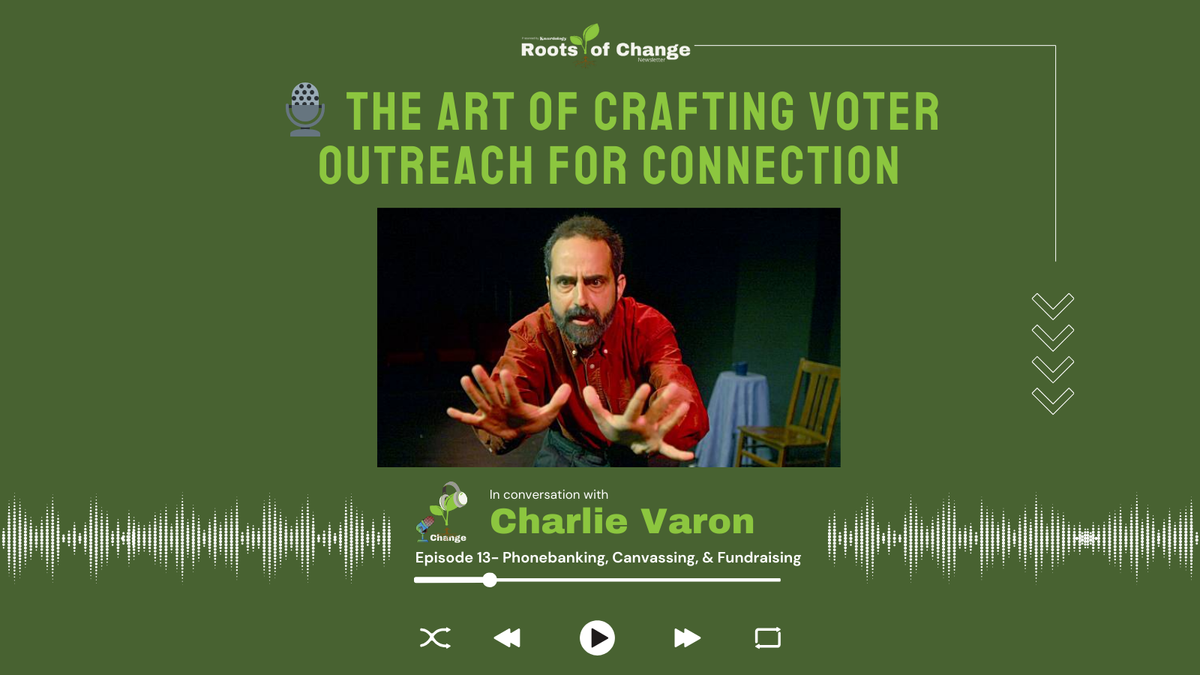
🌱 Burnout Nation | Has Productivity Gone Off the Rails?
Part I: Work, Wealth, and Productivity in 2024
Welcome Back! 👋🏼
We have a packed newsletter this week. We explore the origins of "knowledge" work that has led to today's overwork and the shifts to start cultivating an alternative to our burnt-out work culture. I also spoke with Charlie Varon last week to demystify voter outreach and react to the Harris-Waltz mania. Read on for more...
In Case You Missed It: 🌱 Supercharging Wealth Inequality & Burnout Culture
What You Can Expect
⏳ Expanding Timelines for Change
🤖 Mechanizing Human Potential
🎙 The Art of Crafting Voter Outreach
🌺 Don’t Make the Same Mistake as JD Vance
🗞 News with a Social Change Lens
🌱 Mid-August Pacing
Expanding Timelines for Change
If there’s one theme of this newsletter it would be that change takes place over time and through intention. Change does not happen because of one election or one person. The crisis of our time will not be solved with simple fixes, “project sprints,” or in 6-month time frames.
Then why do we work for change like this?
Everywhere you look, change and care work are undervalued and exhaustive. The non-profit industrial complex has a burnout problem that’s leading to brain drain that hurts marginalized folks most both in the nonprofit’s impact but also within its own workplace. Similarly, campaigns staff up and hire thousands for an intense three-month period of pushing our human bodies to the limit and then tear down these campaign structures as soon as election day has passed. Closer to home, it’s hard to fathom the unpaid labor typically done by women. Luckily, we can quantify it. Managing A Household Is Worth $3.8 Trillion In Economic Value.
The answer to creating change cannot be to sacrifice people who care enough to do the work. As the wealth and power gap widens, the stakes feel higher and yet pushing ourselves to the max will not win. It’s really hard to be effective activists if people are constantly going through a boom and bust cycle of their work. It’s so much harder to be strategic with burnout. In the end, short term gains in productivity lead to long-term gaps in strategic planning.
So why do we do it? What are the origins of our burnedout work culture?
Mechanizing Human Potential
Our current state of work is like most things, built on top of many layers of harmful ideas about work and human capacity. The origins of the hyper productive office worker comes from the previous era of work, the Industrial Revolution.
Henry Ford is considered a hero in U.S. business institutions because he innovated by learning from agricultural productivity techniques to create the assembly line to build the Ford Model T car. Ford switched his factory to an assembly line where one employee would work on a small repetitive task to hand-off to the next person to build a fully functional car by the end of the line. In 1913, it only took 1.5 hours to build a car compared to the previous 12.5 hours. This was a huge business success because it meant that the company could produce more, faster and thus make more profit.
The catch, of course, was that workers were worse-off. Corporations and wealthy businessmen like Ford traded productivity for their worker’s wellbeing. Doing a repetitive task is boring and unfulfilling. It also leads to more injuries and it gives corporations an excuse to pay their workers less. The phrase “unskilled work” comes from this era, after all. It separated managers and other knowledge workers away from more physical work. The not so subtle emphasis is that “being smart with your brain” is better and thus better paid. This separation lays the permission structure to undervalue people in the working class as lesser and therefore blame them for being underpaid. It's not a coincidence that "unskilled" work is also done primarily by Black and brown people.
When the economy shifted to more “knowledge” workers, capitalists needed a way to quantify productivity and keep up the ever increasing need for profitability. The assembly line became a precursor to future “knowledge” work. As office jobs skyrocketed after WWII, businesses tried to bring the concept of productivity into a style of working that is more amorphous and fluid. An assembly line wouldn’t really work, because “knowledge” work isn’t usually repetitive or predictable. Peter Ducker wrote in the The Effective Executive in 1967, “The knowledge worker cannot be supervised closely or in detail. He can only be helped. But he must direct himself.”
The hybrid solution was for workers to figure out how they want to work and then to evaluate employee productivity based on what got done. This created a world where employees don't get direction or frameworks for work, but are expected to increase their productivity over time. Without diving too deep, this model is problematic because measuring work is superficial. Evaluating productivity usually means counting the number of reports finished, programs implemented, and meetings taken. These visual queues of work aren't the only or most important parts of work, especially when we think about systems change (something Charlie and I discuss).
In our modern tech world, this approach has also led to the illusion of busyness. As expectations for productivity increased over the decades and new technology was adopted, people began to gravitate towards work that outwardly shows you're contributing. Even Don Draper had to send an occasional office flyer to justify his martini lunches! Most knowledge workers now find themselves stressing about their responsiveness in email, the number of Slacks they send, or how many meetings they can fit on their calendar. It makes sense why. When the pandemic hit, there was freedom for office workers to live more balanced by working closer to their life. Then it quickly became a game of "show & tell" to prove that you were working and being a good employee. More recently, it seems like this has translated to social media and tech. The rise of the creator economy means people are transferring this pseudo-productivity to their personal lives.
Pacing the Revolution
This way of life is unsustainable and we're seeing the cracks in the system are showing constantly with union struggles, a labor market squeeze, and Lina Kahn catching up to greedflation.
People want a different way, but our systems and culture of work is deep and hard to change. Since deciding to strike it on my own and set my own schedule, I've made many mistakes and fallen back on old bad habits of work. It's hard to break from something that we've been taught and reinforced our whole lives. A slower, more intentional way of working isn't natural when we're taught 40 hours is standard and "always on" is now the norm.
Next week, I offer some perspectives on shifting and reframing what work means from Frida Kahlo and other members of the Global Majority. While it can feel counterintuitive, a slow productivity approach to change will build stronger and longer-term solutions to problems that seem insurmountable today.
Enjoying our newsletter? Subscribe to get our resources and support in your inbox weekly. I created Roots of Change Media to help busy communicators and activists practice intentional activism through a decolonized lens.

🎙 The Art of Crafting Voter Outreach with Charlie Varon
Through my activism, I have met many incredible people. Charlie Varon has brought joy and art to political activism along with his decades of performance and story building. We carry that same joy and humor into our conversation about voter outreach. Come for the Bernie Sanders impression and stay for the helpful tips on how you can get involved in this election! Charlie demystifies phonebanking, donation asks, and talking to voters to help more folks feel comfortable doing the uncomfortable!
Listen on Spotify
Listen on Apple Podcasts
Watch on YouTube


Last Week's Flowering Deep-Dive
📚 Don’t Waste Your Ad Dollars | Tips for 2024 Fundraising
Don’t Make the Same Mistake as JD Vance
While it's fun to laugh at the right-wing's communications gaffes, they can also be informative. Take Trumps (current) VP pick's recent rally in Philadelphia. His team printed a giant "Kamala Chaos" banner behind his speech. When the crowd filled in, it just looked like he was at a Kamala rally. 🤦🏻♂️

- Avoid using your opponent's name in election messaging. People's media consumption is chaotic and filled with a lot of messaging. Sometimes people only catch a few things from a speech or event. Don't let one of those things be the name of your opponent.
- In some places, name recognition alone can help shift votes. It's actually important to use your candidate's name frequently so that low-interest voters will remember the name in their ballot.
- Consider which words you use frequently and how that might be shaping the election. Language can be powerful to shift people's perceptions for or against something. Are you mimicking their abortion language or talking about people's freedoms?

- 📚 Texas Voter Registration Hoops - 🚨 Texas voters! They make it really hard to register to vote. Despite having literal forms on their website, you can’t register to vote online! You will need to print and fill out a physical form and mail it. Get registered ASAP and follow these instructions. Texans have until October 7th to register.
- 🤓 The Root 🌱 - This should be illegal, but the right-wing SCOTUS has continually struck down the Voting Rights Act. The Texas GOP understand that Texas is not a red state, but a voter suppression state. They add every hurdle they can to voting to keep power. The more we turn out to vote and kick out undemocratic officials, the more we can expand voting access and elect officials who represent the people.
- 📚 How Israel Obstructs Aid & Starves Palestinians - Refugees International has a report exposing the tactics that the Israeli government and IDF use to keep aid out of Gaza. Gaza is suffering the worst famine-like conditions in modern history and the U.S. government just approved $20 billion more in weapons to bomb a population that has already lost at least 40,000 lives, mostly children.
- 🤓 The Root 🌱 - The International Court of Justice has ruled that Israel's occupation of Gaza and Palestine is illegal. This week, they ruled that BDS (boycott divest and sanctions) is not only illegal but important. We must face the reality that the U.S. is funding an intentional effort to starve a population. If you're looking for ways to support, I always recommend the Palestinian Resource Guide.
- 📚 The Women Taking On Fast Fashion - Maxine Bédat, the executive director of the New Standard Institute, is taking on fast fashion and plastics. She’s championing New York’s “Fashion Act,” to regulate reporting of environmental and social impact from fashion brands.
- 🤓 The Root 🌱 - The best part of this legislation is that it comes with action. Companies would need to set and meet science-based targets on carbon emission, water pollution, and avoid human rights abuses in their supply chains. If you’re in NY, call your local reps!
- 📸 Brands that Use Prison Labor - I wrote in February about how the top brands in the U.S. are using prison labor to save on costs, helping their record profits and stock market gains. Well, I found this awesome list of brands so we can all boycott them. 🙂
- 🤓 The Root 🌱 - After SCOTUS Grants Pass ruling that criminalizes being unhoused, we can expect to see a surge in imprisoning the poor. More people in prisons means more prison labor. This is modern day slavery y’all and we have to stop this. Organize, vote, protest, boycott now.
And that's a wrap on this week’s newsletter! We hope you found this helpful in your work to cultivate lasting social change. Forward this to a friend and help democratize communications!
If you have any topics you want covered or have any questions, please reach out and let me know.
In Solidarity,
Sam Chavez
Roots of Change Founder
🌱 Seedling Member Zone
For this week's video, I talk about the next few weeks and giving ourselves some permission to go a little bit slower. Find our latest videos on our 🎬 Quick Bites page.

This post is for paying subscribers only
SubscribeAlready have an account? Log in



